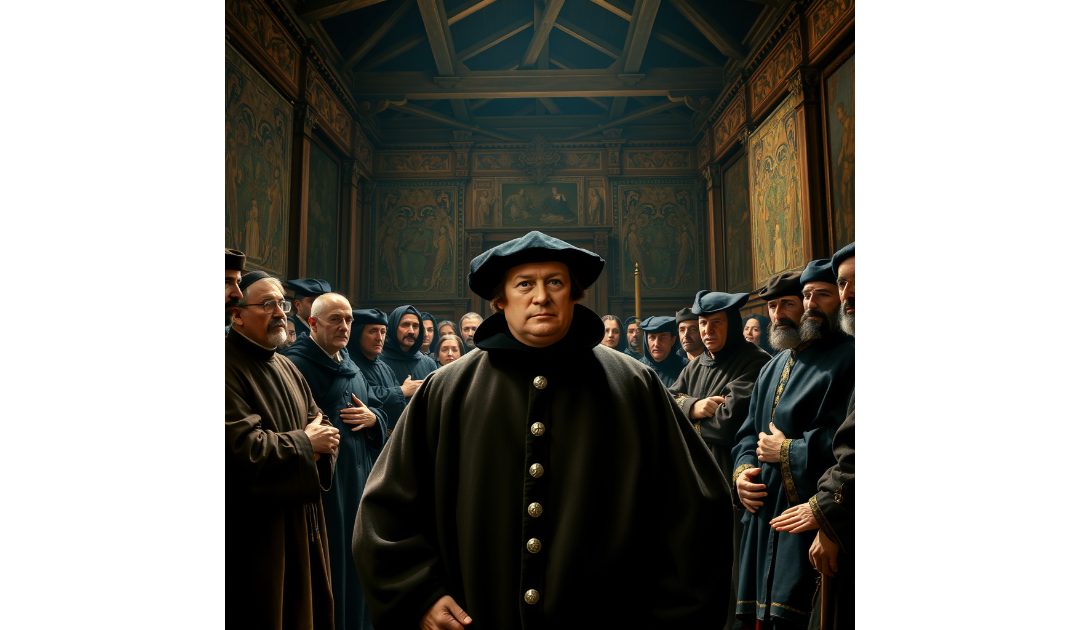On the 17th of April, 1521, the trial of Martin Luther began during the Diet of Worms. Martin Luther is mentioned in Called to Account, the fourth book in the Sir Anthony Standen Adventures.
The Diet of Worms was a significant event in European history, held in 1521 in the city of Worms, in present-day Germany. This imperial council was convened by the Holy Roman Emperor Charles V and is most notable for the important role it played in the Protestant Reformation. The event marked a critical point in the conflict between the Catholic Church and Martin Luther, the German monk whose teachings and writings had sparked widespread religious reform.
The backdrop to the Diet of Worms was a Europe in religious tumult. In 1517, Martin Luther had famously nailed his Ninety-Five Theses to the door of the Wittenberg Castle Church, criticizing the Catholic Church’s practice of selling indulgences and questioning the authority of the pope. His ideas quickly spread throughout Europe, aided by the advent of the printing press, and they attracted both staunch supporters and vehement detractors.
By 1520, Martin Luther had been officially declared a heretic by Pope Leo X in the papal bull Exsurge Domine, and he was excommunicated from the Church. However, Luther’s influence continued to grow, prompting Emperor Charles V to address the issue directly. The Diet of Worms was summoned as part of Charles V’s effort to unify his empire under one faith and to address the growing challenge posed by Luther’s reformist ideas.
The Diet was attended by various princes and nobles of the Holy Roman Empire, clergy, and other dignitaries. Martin Luther was called to the Diet to recant his teachings. On the 17th of April, 1521, he appeared before the assembly. Johann Eck, acting as the spokesperson for the emperor, questioned Luther about his books and teachings, and demanded that he renounce them.
In a moment that would prove to be pivotal for the Protestant Reformation, Martin Luther refused to recant. On the 18th of April, 1521, he delivered a bold and defiant speech, in which he famously stated, “Unless I am convinced by the testimony of the Scriptures or by clear reason… I am bound by the Scriptures I have quoted and my conscience is captive to the Word of God. I cannot and will not recant anything, since it is neither safe nor right to go against conscience. May God help me. Amen.” This declaration of conscience underscored the Reformation’s emphasis on individual faith and the authority of the Scriptures over the edicts of the Church.
Following Luther’s refusal to recant, the Diet issued the Edict of Worms on the 25th May 1521. This edict declared Martin Luther to be an outlaw and heretic, banning his writings and calling for his arrest. However, Luther had already secured protection from Frederick the Wise, Elector of Saxony, who arranged for him to be kidnapped and hidden at Wartburg Castle. Here, Luther continued his work, translating the New Testament into German and further developing his theological ideas.
The Diet of Worms thus played a crucial role in the spread of Protestantism. It solidified Martin Luther’s position as a key figure in the Reformation and highlighted the deep divisions within Christendom. The events at Worms set the stage for the fragmentation of the Catholic Church and the rise of Protestant denominations, transforming the religious, political, and cultural landscape of Europe. The Diet of Worms remains a symbol of the struggle for religious freedom and the assertion of individual conscience against institutional authority.

